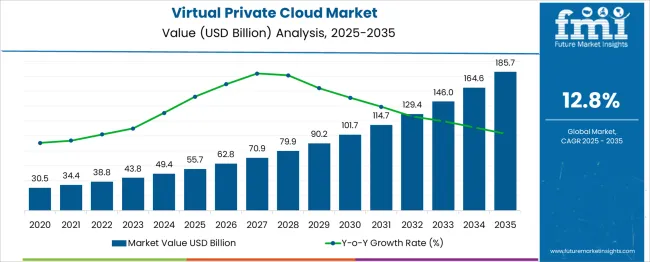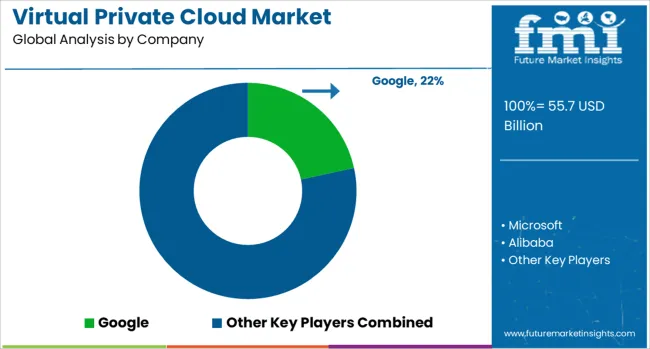The Virtual Private Cloud Market is estimated to be valued at USD 55.7 billion in 2025 and is projected to reach USD 185.7 billion by 2035, registering a compound annual growth rate (CAGR) of 12.8% over the forecast period.

| Metric | Value |
|---|---|
| Virtual Private Cloud Market Estimated Value in (2025 E) | USD 55.7 billion |
| Virtual Private Cloud Market Forecast Value in (2035 F) | USD 185.7 billion |
| Forecast CAGR (2025 to 2035) | 12.8% |
The growing need for businesses to have a safe environment for cloud mobility has resulted in a surge in the adoption of virtual private cloud services. SMEs are also using a huge number of private clouds for the organization's security in order to boost income opportunities.
Many industries have begun to embrace the growing need for agility and automation. This is changing the virtual private cloud market outlook drastically.
The rapid increase in demand from small and medium enterprises, the increasing adoption of cloud-based services by large enterprises across various industry verticals, and the increased number of data breaches over a network, which is primarily due to unauthorized access by third parties, are some of the key factors driving the adoption of virtual private cloud.
Poor internet infrastructure in some nations may provide a hindrance to the growth of demand for virtual private clouds. The growth of the Internet of Things is likely to open up chances for the virtual private cloud business.
The virtual private cloud market has grown as the demand for security, IT modernization, agility, automation of manual processes, and rising cost reductions has increased. On the contrary, a scarcity of professionals is limiting the virtual private cloud market expansion.
Governments have been heavily investing in digitizing their operations in order to boost productivity and save costs through effective management methods, resulting in the widespread adoption of virtual private clouds among businesses. Furthermore, fast-evolving digitization business models such as as a service have considerably aided product innovation and development among virtual private cloud providers worldwide.
The virtual private cloud market is divided into banking, financial services and insurance, IT and telecom, government and defense, healthcare, media and entertainment, retail, manufacturing, and others, by vertical.
With the rise in real-time mobile payment services, the BFSI virtual private cloud industry is expected to witness the most widespread use of the virtual private cloud. Various customer-centric models have emerged as a result of the increased need for streamlined transactions.
The expanding presence of digitalization activities, as well as growing worries about data storage, recovery, and cybersecurity in BFSI businesses, is projected to boost the demand for virtual private clouds.
The virtual private cloud market is divided into large and small enterprises as per the organization size. As per the virtual private cloud market analysis, because of the growing volume of data and the increased need for effective storage and management, major organizations are predicted to bring substantial recompense to the VPC sector, based on their size.
Large enterprises have led the way for enhanced flexibility by running many applications. Virtual private cloud solutions not only increase performance when implementing resource-intensive applications but also save money. The growing trend of organizational mobility is anticipated to help the virtual private cloud market grow even faster.
During the projected period, North America is expected to have the biggest virtual private cloud market share.
The existence of multiple businesses supplying and the rising adoption of virtual private cloud has made the region an established market. The key reasons driving cloud computing usage in North America are organizations' shifts toward innovative technologies and the rising adoption of digital business strategies.
The market in North America is likely to be driven by enterprises' rising budget allocation for cloud services. The major North American countries likely to contribute to the virtual private cloud market are the USA and Canada.
The development in technological transformation projects and strong economic advancements in China and India are likely to produce significant revenue for the virtual private cloud business in the Asia Pacific due to the high rates of adoption of virtual private cloud in the region.
| Regions | CAGR (2025 to 2035) |
|---|---|
| United States | 12.5% |
| United Kingdom | 11.8% |
| China | 12.1% |
| Japan | 11.0% |
| South Korea | 10.3% |

In order to strengthen their competitive position and global presence, virtual private cloud market players are actively pursuing strategic collaborations, including mergers and acquisitions, as well as working on incorporating the latest technology into their services to come up with innovations. The virtual private cloud market is highly competitive.
Some of the recent developments in the virtual private cloud market are:
In February 2024, IBM and Vodafone partnered to launch Vodafone Virtual Private Cloud, a new private cloud platform designed to help Vodafone's Portuguese enterprise clients with scalability, efficiency, and security.
Dell Technologies unveiled Project Apex, a new private cloud service, in February 2024. Dell Technologies Cloud Platform is likely to enable clients to scale up or down their IT infrastructures as a result of the launch.
The global virtual private cloud market is estimated to be valued at USD 55.7 billion in 2025.
The market size for the virtual private cloud market is projected to reach USD 185.7 billion by 2035.
The virtual private cloud market is expected to grow at a 12.8% CAGR between 2025 and 2035.
The key product types in virtual private cloud market are small and medium-sized enterprises and large enterprises.
In terms of vertical, banking, financial services, and insurance segment to command 26.7% share in the virtual private cloud market in 2025.






Full Research Suite comprises of:
Market outlook & trends analysis
Interviews & case studies
Strategic recommendations
Vendor profiles & capabilities analysis
5-year forecasts
8 regions and 60+ country-level data splits
Market segment data splits
12 months of continuous data updates
DELIVERED AS:
PDF EXCEL ONLINE
Virtual Pipeline Market Size and Share Forecast Outlook 2025 to 2035
Virtual Customer Premises Equipment Market Size and Share Forecast Outlook 2025 to 2035
Virtual Infrastructure Manager Market Size and Share Forecast Outlook 2025 to 2035
Virtual Companion Care Market Size and Share Forecast Outlook 2025 to 2035
Virtualized Radio Access Network Market Size and Share Forecast Outlook 2025 to 2035
Virtual Workspace Solutions Market Size and Share Forecast Outlook 2025 to 2035
Virtual Prototype Market Size and Share Forecast Outlook 2025 to 2035
Virtual Assistant Services Market Size and Share Forecast Outlook 2025 to 2035
Virtual Power Plant (VPP) and V2G Orchestration Market Analysis - Size, Share, and Forecast Outlook 2025 to 2035
Virtual Power Plant Market Size and Share Forecast Outlook 2025 to 2035
Virtual Machines Market by Type, by Enterprise Size, by Industry & Region Forecast till 2035
Virtual Extensible LAN (VXLAN) Market Size and Share Forecast Outlook 2025 to 2035
Virtual PLC and Soft PLC Market Size and Share Forecast Outlook 2025 to 2035
Virtualized Evolved Packet Core (vEPC) Market Size and Share Forecast Outlook 2025 to 2035
Virtual Cards Market Size and Share Forecast Outlook 2025 to 2035
Virtual Try-On Platform Market Analysis Size and Share Forecast Outlook 2025 to 2035
Virtual Client Computing Market Size and Share Forecast Outlook 2025 to 2035
Virtual Event Platforms Market Trends - Growth & Forecast 2025 to 2035
Virtual Dispersive Networking (VDN) Market Growth – Trends & Forecast 2025 to 2035
Virtual Retinal Display Market Insights - Trends & Forecast 2025 to 2035

Thank you!
You will receive an email from our Business Development Manager. Please be sure to check your SPAM/JUNK folder too.
Chat With
MaRIA